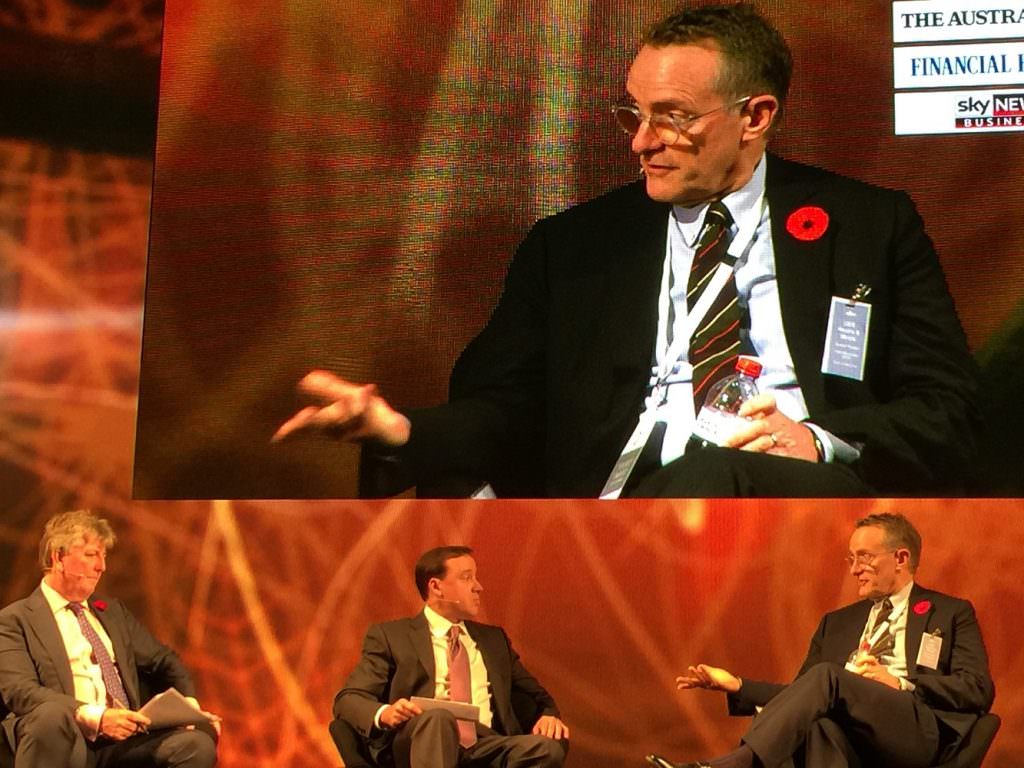Regular readers of Cuffelinks know we are fans of the straightforward and direct writing of Howard Marks. In September 2014, he personally gave Chris Cuffe permission to republish a confidential presentation he had given to institutional clients of Oaktree Capital.
Since then we have reported on a conference where he said there is no way to predict commodity prices, a more recent memo called 'Risk Revisited Again', and then when he was a star attraction in the Sohn Hearts & Minds Conference in Sydney (see photo below).

His latest memo was therefore received with much enthusiasm, especially given the global uncertainty heightened by a totally unpredictable new US President. We need a calming influence in a sea of speculation. Marks’s latest work is titled 'Expert Opinion'. This article is a brief summary, and the full paper is here.
A poor year for polls and media
Marks goes to some length to describe the poor forecasting of opinion polls on both Brexit and the Presidential election. Even the legendary Nate Silver, who established his reputation when he correctly predicted all 50 states in the 2012 race, said Clinton was 71% likely to win, and many pundits were at 90%. The experts either misinterpreted the data or failed in their sampling.
Equally important, most experts forecast that a Trump win would be bad for markets, but then we experienced the strong ‘Trump rally’. Marks gives this warning:
“First, no one really knows what events are going to transpire. And second, no one knows what the market’s reaction to those events will be.”
There are no ‘facts’ about the future, only opinions. We also have a media industry where ‘news’ is not original research or reporting, but a collection of personal opinions backed by little data, often with some contentious line of argument which is supposed to be the story. It’s no coincidence that the Oxford Dictionary word of the year for 2016 was ‘post-truth’, defined as:
“relating to or denoting circumstances in which objective facts are less influential in shaping public opinion than appeals to emotion or personal belief.”
Marks uses the example of the New York Post’s Bettor’s Guide, where 11 experts advise readers which teams to bet on. The overall results are distributed around the 50/50 level, suggesting it’s little more than a coin toss.
Warren Buffett told Marks that for a piece of information to be worth pursuing, it must be both important and knowable. The CEO and President of Vanguard, Bill McNab, recently said:
“We’ve seen over and over again that the forecasters don’t get it right. All the people who were wrong about Trump and Brexit are now putting forth all these things we should take as gospel in terms of what’s going to happen. That makes no sense to me.”
The influence of macro guesses
Last year, I presented a one-hour webinar for one of our sponsors. The subject was behavioural biases in our investing, using my own habits and SMSF as an example. At no stage did I portray myself as a stock picker or economist (although for my sins, I do have an economics degree). At the conclusion of the talk, clients sent in questions, and of course, they included: “Where do you think the Australian dollar will be at the end of the year?” and “Is the ASX good value at the moment?”
Like any ‘expert’, I gave reasons why either could go up or down and then a personal view, but the best answer is the one nobody likes to hear. It sounds unprofessional to say, “I don’t know” but it should be a far more common response. I can know about the superannuation rules or the difference between an ETF and a managed fund, and these are useful facts, but what is my opinion on the future of the AUD worth?
It’s refreshing to read Marks say the most common question he is asked is about when the Fed will raise interest rates, and his response is consistent: “How would I know, and why do you care?” Marks says nobody knows, even the closest Fed watchers, and probably not the Fed itself. Importantly for the effect on markets, events may already be priced in, and so even if a prediction is correct, it might have no value. Nobody predicted a price fall in oil of 75% between 2014 and 2016.
Not only does Marks not know what innings we are playing, he does not know how long the game will last. We are usually dealing with the unknowable:
“Developments in economies, interest rates, currencies and markets aren’t the result of scientific processes. The involvement in them of people – with their emotions, foibles and biases – renders them highly unpredictable.”
Some of Marks’s favourite sayings on forecasting
We have two classes of forecasters: Those who don’t know – and those who don’t know they don’t know. – John Kenneth Galbraith
No amount of sophistication is going to allay the fact that all of your knowledge is about the past and all your decisions are about the future. – Ian Wilson (former GE executive)
Forecasts usually tell us more of the forecaster than of the future. – Warren Buffett
I never think of the future – it comes soon enough. – Albert Einstein
What does Marks rely and act on?
Given his legendary success as an investor, Marks must be acting on some guidance, instinct or insight. He makes his big gains acting on extremes in the market, especially capital markets, while not betting heavily in less distinct markets. He suggests investors ask whether markets are in ‘an extended state’ or not. That is, is there euphoria, depression, illiquidity, overly generous pricing, etc. These questions can be answered in a more predictable and helpful way.
Graham Hand is Managing Editor of Cuffelinks.